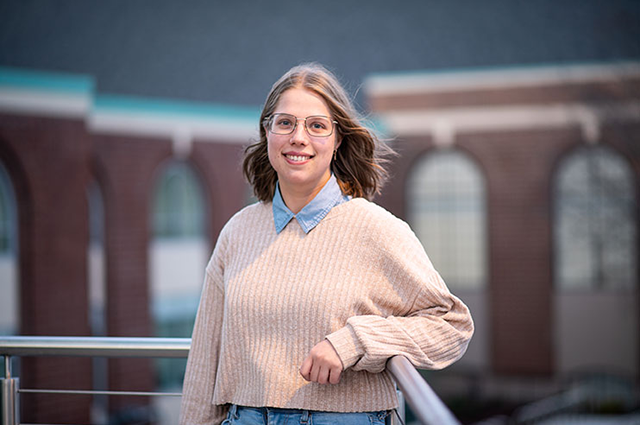Inspired to Engineer a Better Future: Zosia Stafford

Optimism and curiosity are twin engines that drive the imagination of young engineers at Tufts, whose professors nurture skills, knowledge, and social awareness to help translate their visions into real-world applications. This year, as Engineers Week celebrates the theme of “Reimagining the Possible,” Tufts Now reached out to five School of Engineering undergraduates and graduate students who are bringing energy and big ideas to a changing world.
Zosia Stafford, E22
Zosia Stafford is a senior combining engineering and liberal arts by majoring in both mechanical engineering and philosophy. At the School of Engineering, she is deeply interested in material science—the design and discovery of new materials. She juggles courses with a job as area supervisor for the university makerspace, Nolop Fabrication, Analysis, Simulation and Testing (FAST) Facility, and as a teaching assistant. She also is gaining first-hand experience in material science applications through a part-time internship with Transaera, focused on developing energy-efficient cooling systems.
Why material science: My first year of high school, I read this book—Stuff Matters—about materials of basic everyday things, and the fascinating chemistry and design process behind that. I was like, “Oh yes—that's cool!” At Tufts I continue to find material science fascinating. It’s crucial to the design of everything, like windows and fabrics—every product that you own. It's all super interconnected. When you understand the properties and the behaviors of materials that you're working with, you’re able to create better, more informed designs, as well as then modify those materials and improve them so they can be applied in new ways.
A big idea: Material science is going to see a ton of growth in the next decade. As our designs get more complex and more efficient, the limiting factor in most cases is materials. And a lot of times, the best way to make changes is to be changing the materials. Personally, I would like to leverage my engineering skills on environmental issues, while using my philosophy background to be a better thinker, communicator, and more ethical engineer.
Why progress matters: One area where progress matters is air conditioning. It’s an industry that's tied to what we can do to curb global warming. It takes a lot of energy to power a standard air conditioner because the refrigerant must cool both the incoming air and the water vapor in the air. Water takes more energy to cool, and as it cools, it condenses, which complicates the process. That’s why on humid summer days your air conditioner works overtime and taxes the electrical grid.
At Transaera, we're taking water out of the equation using metal organic frameworks that can passively absorb it before it enters the system. With this step, you have a more energy-efficient air conditioner and lighten the burden on the power structure. Novel materials like these metal organic frameworks are critical to our planet’s future. By studying and characterizing their properties and degradation behavior, I can help choose materials that best support a sustainable transition to a zero-carbon world.
This excerpt is from "Inspired to Engineer a Better Future" by Laura Ferguson, Tufts Now.
Learn more about undergraduate programs Learn more about graduate programs Take a virtual tour of campus
Department:
Mechanical Engineering